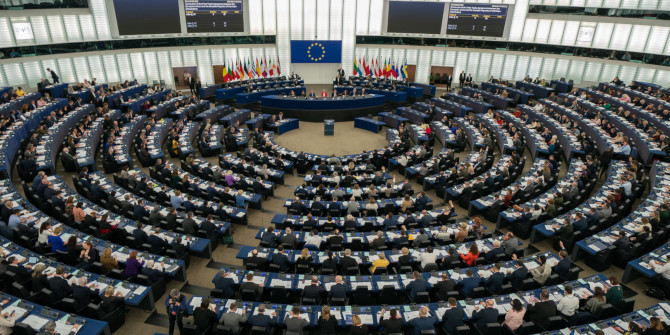 A draft proposal for the UK’s renegotiation of its EU membership was published on 2 February. Benjamin Leruth assesses whether the proposal meets the goals set out in David Cameron’s letter to Donald Tusk in November. He writes that while in principle the key aims set out by Cameron have been met, there remains a long way to go before a final deal can be secured with all of the EU’s member states.
A draft proposal for the UK’s renegotiation of its EU membership was published on 2 February. Benjamin Leruth assesses whether the proposal meets the goals set out in David Cameron’s letter to Donald Tusk in November. He writes that while in principle the key aims set out by Cameron have been met, there remains a long way to go before a final deal can be secured with all of the EU’s member states.
On 2 February, Donald Tusk unveiled a draft proposal for a new settlement for the United Kingdom within the European Union. This long-awaited, 16-pages long proposal, offers four baskets of reforms in the fields of economic governance, competitiveness, sovereignty; and social benefits/free movement, which were identified in David Cameron’s letter to Donald Tusk published in November 2015. This proposal forms the basis for the European Council meeting that will be taking place on 18-19 February. Should all EU member states agree on these terms, it is expected that the agreement will be finalised then.
Economic governance
The 2015 Conservative Party manifesto stated the party’s commitment to ‘protect [the United Kingdom] from any further integration of the Eurozone’, which leaves the UK out of the inner circle of Eurozone member states. While the draft plan recognises the need to deepen integration in this policy area, the series of measures proposed by Donald Tusk rely on the principle of mutual respect between EU member states participating or not in the development of the Economic and Monetary Union [EMU]. More particularly, the document states that countries that do not participate in the EMU or in the banking union will not be liable to support the Eurozone. In sum, these proposals may lead to an increased differentiation between EMU and non-EMU members in the European Union.
Competitiveness
In his letter from November 2015, David Cameron highlighted the need to ‘boost the competitiveness and productivity of the European Union and to drive growth and jobs for all’. The suggested response from Donald Tusk is rather short: he insists that EU institutions and member states should take concrete steps toward better regulation, in order to lower administrative burdens and compliance costs on business.
This section does not introduce any particular novelty or exemption for the United Kingdom, but aims at reassuring the British authorities (and voters) that the European Union is moving toward better regulation and less constraints for business owners.
Sovereignty

David Cameron’s initial proposal was threefold: getting an opt-out from the concept of ‘ever closer Union’; enhancing the role of national parliaments in the European decision-making process; and emphasising the importance of the principle of subsidiarity. The three-page response from Donald Tusk clearly responds to the United Kingdom’s demands.
Firstly, while it insists that the notion of ‘ever closer union’ does not offer a basis for extending the scope of European Treaties and legislation, it also recognises that the United Kingdom ‘is not committed to further political integration into the European Union’. The proposal further states that the United Kingdom’s ‘specific situation’ will be incorporated into the treaties, thus offering a (mostly symbolic) opt-out from this concept.
Secondly, the proposal suggests the introduction of a so-called ‘red card’ procedure, enabling national parliaments to block unwanted legislative proposals in case of non-compliance with the principle of subsidiarity. While the existing ‘yellow card’ system has once proved to be successful in terms of influencing EU policy, it remains to be seen whether the proposed ‘red card’ procedure would effectively be used by national parliaments.
Social benefits and free movement
Immigration is a highly politicised issue in the United Kingdom, and constituted one of the key topics raised during the last general election. It is also likely to be one of the key issues that will influence undecided voters in the EU referendum. In its manifesto, the Conservative Party proposed that ‘EU migrants who want to claim tax credits and child benefit must live here and contribute to our country for a minimum of four years. This will reduce the financial incentive for lower-paid, lower-skilled workers to come to Britain.’ This policy, dubbed a ‘four-year emergency brake’, was restated in David Cameron’s letter to Donald Tusk.
While Eastern European countries are particularly reluctant to accept this principle as it would mean that their citizens working in the UK would be discriminated against, the proposal included an ‘emergency brake’, which could be applied by any EU member state facing an ‘exceptional situation’ upon approval by the Council. However, the timeframe still remains to be negotiated, with the draft text stating that the emergency brake would be extendable for two successive periods. This suggests that David Cameron and Donald Tusk were not able to reach an agreement on the issue.
What next?
In a nutshell, David Cameron delivered almost everything that was mentioned in the Conservative Party manifesto, in line with his EU Bloomberg speech from January 2013: an opt-out from ever closer union; increased differentiation and mutual respect between Eurozone and non-Eurozone member states; cutting EU ‘red tape’; introducing a ‘red card’ system for national parliaments; and introducing a four-year emergency brake on benefits for EU migrants.
Based on the initial demands included in the Conservative manifesto, this is a decent deal for both the United Kingdom and the European Union. In a speech given at Chippenham, David Cameron strongly defended the draft deal, stating that the UK would have ‘the best of both worlds’ under these terms. However, both David Cameron and Donald Tusk will now have to reach an agreement with some of the most reluctant EU member states, particularly Poland, at the European Council on 18-19 February. It is expected that the proposed emergency brake and its timeframe will be the main subject of discussion.
Should the deal be sealed, it remains to be seen whether the proposal will be sufficient to convince undecided voters at the domestic level. On the one hand, ‘leave’ campaigners, such as Leave.EU and Vote Leave, have already criticised the renegotiation plan, stating that demands have been watered down by the EU. On the other, the Stronger In campaign applauded the deal and denounced the ‘hypocrisy of leave campaigners’. Now that the draft deal is out, the official referendum campaign may now be only weeks away.
Please read our comments policy before commenting.
Note: This article gives the views of the author, and not the position of EUROPP – European Politics and Policy, nor of the London School of Economics.
Shortened URL for this post: http://bit.ly/207AogR
_________________________________
 Benjamin Leruth – University of Kent
Benjamin Leruth – University of Kent
Benjamin Leruth is a Research Associate at the University of Kent. He has a PhD from the University of Edinburgh and previously worked as a Teaching Fellow in Politics at the University of Bath, and a guest researcher at the ARENA Centre for European Studies (University of Oslo).





